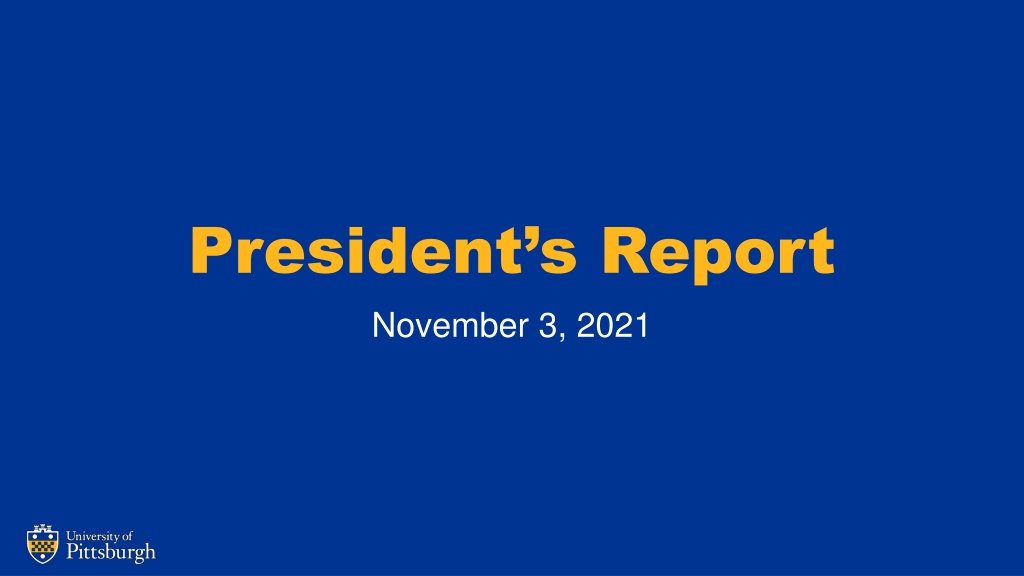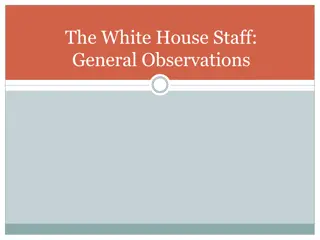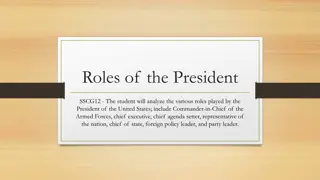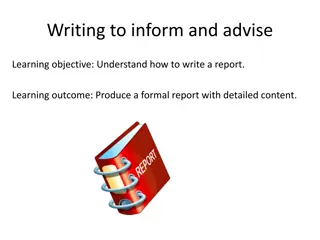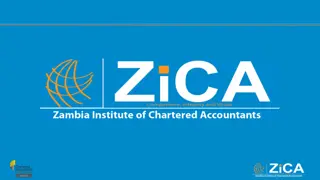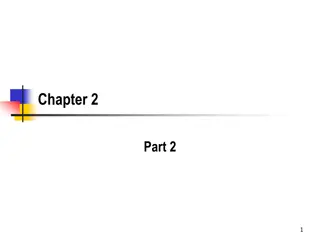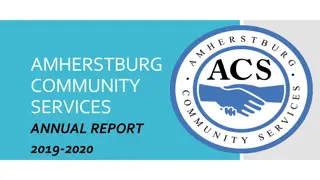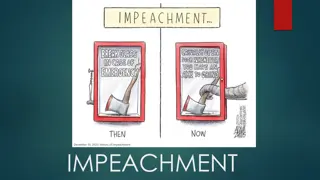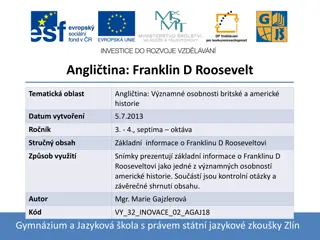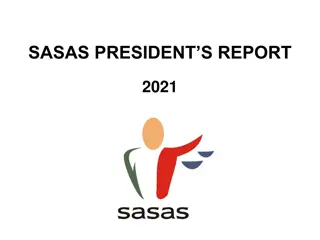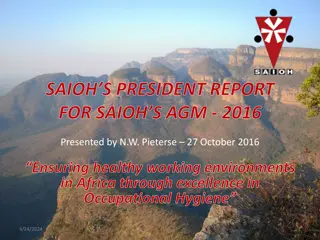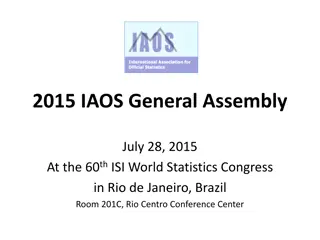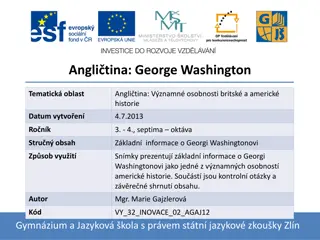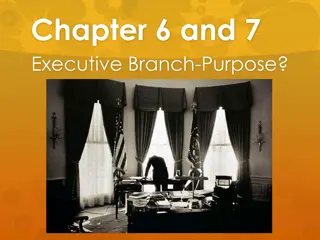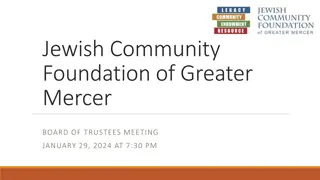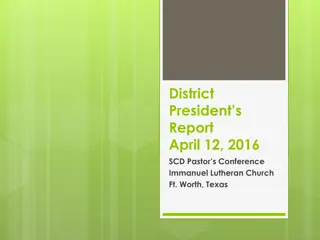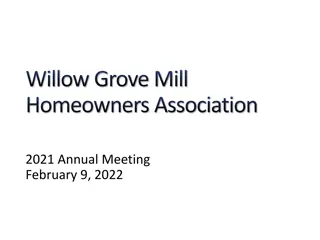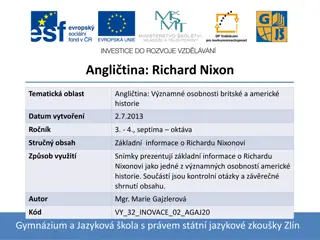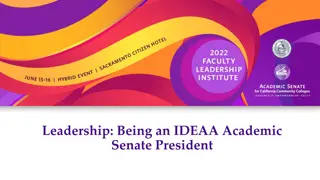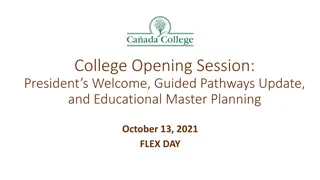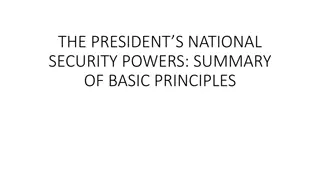President’s Report
This report details the significant events and developments discussed during the President's meeting on November 3, 2021. It covers a range of topics, providing insights into the current state of affairs and future plans. The report aims to inform stakeholders and the public about key decisions and initiatives undertaken by the President.
Download Presentation

Please find below an Image/Link to download the presentation.
The content on the website is provided AS IS for your information and personal use only. It may not be sold, licensed, or shared on other websites without obtaining consent from the author.If you encounter any issues during the download, it is possible that the publisher has removed the file from their server.
You are allowed to download the files provided on this website for personal or commercial use, subject to the condition that they are used lawfully. All files are the property of their respective owners.
The content on the website is provided AS IS for your information and personal use only. It may not be sold, licensed, or shared on other websites without obtaining consent from the author.
E N D
Presentation Transcript
Presidents Report November 3, 2021
Main Areas Vaccine Requirement Interim Policy Travel Policy Other Policy Updates Academic Searches Union Vote and Shared Governance 2
My shared governance perspective on the vote to unionize Senate Council, Faculty Assembly, and Senate Committees were created by the Board of Trustees in the spirit of shared university governance between university administration, faculty, staff, and students. The constituency of Senate Council, Faculty Assembly, and Senate Committees is broader than the faculty that will be represented by USW in an employment contract. 3
Legality The legal contract negotiations for this subset of faculty will be conducted outside of Council and Assembly, within an elected Bargaining Committee representing those employees. There is a status quo expectation by the employer and individual negotiation is limited for the employer. Council and Assembly are not legal entities. We are not limited in the same way, but this is important for us to be aware of in our work. 4
Scope of Bargaining Unit The bargaining unit was determined by an April 2021 PLRB ruling. https://www.dli.pa.gov/Individuals/Labor-Management- Relations/plrb/proposed/2021/Documents/Univ-of-Pgh- PERA-R-19-2-W.pdf 5
Scope of Bargaining Unit Included: all full-time and regular part-time tenure-stream and non-tenure-stream faculty and librarians in the Provost Area, Health Science Schools, and School of Law, employed by the University of Pittsburgh (Pitt, University or Employer) at all campuses in the Commonwealth; and excluding faculty in the School of Medicine, research associates, post- doctoral associates, graduate student employe(e)s, non- faculty professionals, and all non-professionals, guards, supervisors, managerial and confidential employe(e)s as defined in the Act. The petitioned-for unit is approximately 3,000 employe(e)s. 6
Scope of Bargaining Unit Excluding: supervisory or managerial pursuant to PERA includes department chairs, deans, vice/associate/assistant deans, provost, vice/associate vice provosts, vice/associate vice chancellors, campus presidents/vice presidents, various library administrators including associate university librarians, directors, and heads of libraries, directors/associate/assistant directors of specific centers, programs, laboratories, and institutes (~94 of these) 7
Bargaining Committee After the vote certification, there is a 20-day period for contestation. Any action here could delay the process. If that 20-day period ends without any action by employer/employees, as advised by USW, the Bargaining Committee starts formally. USW staff will be working with the Organizing Committee to develop a structure for the Bargaining Committee and a process for electing them. 8
Bargaining Committee From USW: there s always a complex balance to be struck between ensuring that the Bargaining Committee is representative and ensuring that it s a manageable size The USW organizer expects something will be worked out by mid- November. At that point, the Organizing Committee will be reaching out to all of their colleagues about the structure and process. I have asked for transparency around the membership of the Organizing Committee but that is not public information. If you want to talk to someone on the Organizing Committee and are not sure who to reach out to, email info@pittfaculty.org. 9
Scope of the Bargaining Agreement This is currently unknown, but it will be negotiated between the employer and employee representatives. They can waive what to negotiate and agree on what to negotiate. I recommend reading through the PA law PERA, the Public Employe(e) Relations Act. This has the scope of bargaining. The scope of bargaining in PERA specifically includes wages, hours and other terms and conditions of employment 10
Scope of the Bargaining Agreement From PERA: Public employers shall not be required to bargain over matters of inherent managerial policy, which shall include but shall not be limited to such areas of discretion or policy as the functions and programs of the public employer, standards of services, its overall budget, utilization of technology, the organizational structure and selection and direction of personnel. 11
Scope of the Bargaining Agreement From PERA: Public employers, however, shall be required to meet and discuss on policy matters affecting wages, hours and terms and conditions of employment as well as the impact thereon upon request by public employe(e) representatives. 12
First Contract My understanding is that for a first contract, everyone in the bargaining unit votes. After that first contract, you must pay dues to be a member of the union, and only members vote on subsequent contracts. Whether or not you pay dues and if you are in the bargaining unit, you are subject to the terms and rules of the negotiated CBA. (The 2018 Janus legal decision is most relevant here.) 13
Our Work in the Senate Areas strongly impacted: Salaries, benefits, working conditions, grievance process Committees that are working on these issues may find their appointed administrator involvement is limited by status quo operation and/or concerns for bypassing the negotiation process. May be subject to parallel policy or contract negotiation 14
Our Work in the Senate Areas with minimal impact: Tenure and academic freedom Educational Policies Student affairs, Athletics Diversity concerns and advancement Community relations Governmental relations Computing and Technology, Library 15
Immediate Impact Policy Office policies in the shared governance process are moving forward. The Provost s office is rethinking planned policy work that may impact the faculty in the bargaining unit. The resolution on bringing lecturers salaries to the median that was passed last spring must be paused. I have asked Bylaws to examine and consider any changes that may need to be made. 16
